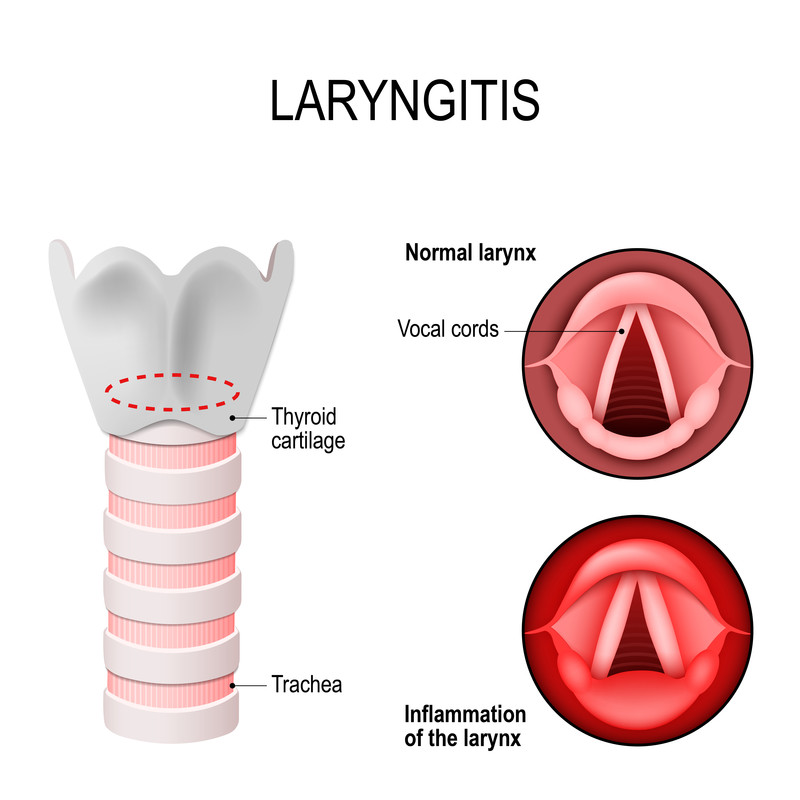Laryngitis: Voice Loss and Throat Inflammation
Laryngitis is inflammation of the larynx (voice box) and commonly causes hoarseness or temporary loss of voice. In Canada, most cases are short-lived and linked to viral upper respiratory infections, such as the common cold or flu.
The larynx plays a key role in breathing, swallowing, and speech. When it becomes inflamed, the vocal cords swell and cannot vibrate properly, resulting in voice changes.
Common Causes of Laryngitis
Acute (Short-Term) Laryngitis
The most common causes include:
-
Viral infections (common cold, flu)
-
Bronchitis or other upper airway infections
-
Overuse of the voice (shouting, prolonged speaking)
-
Exposure to irritants such as cigarette smoke or air pollution
-
Allergic reactions
Bacterial infections of the larynx are rare.
Chronic (Long-Term) Laryngitis
If symptoms last longer than three weeks, possible causes include:
-
Gastroesophageal reflux disease (GERD)
-
Repeated vomiting (e.g., bulimia)
-
Ongoing exposure to smoke or chemical irritants
-
Chronic bronchitis
Signs and Symptoms of Laryngitis
Symptoms often develop within hours to a day and may include:
-
Hoarseness or raspy voice
-
Reduced voice volume
-
Complete loss of voice
-
Tickling, raw, or dry sensation in the throat
-
Constant urge to clear the throat
In more severe cases:
-
Sore throat
-
Fever
-
Malaise
-
Difficulty swallowing
How Laryngitis Is Diagnosed
Diagnosis is usually based on voice changes and symptom history.
For persistent cases, a healthcare professional may examine the larynx using:
-
A small mirror, or
-
A thin, flexible viewing scope
This examination often reveals redness and swelling of the vocal cord lining.
⚠️ Important: Persistent hoarseness lasting more than one week—especially without signs of infection—requires medical evaluation to rule out laryngeal cancer, particularly in adults who smoke.
Management and First Aid Considerations
Treatment depends on the cause and severity of symptoms.
Supportive Care
-
Rest the voice as much as possible
-
Drink plenty of fluids
-
Use steam inhalation or humidified air
-
Avoid whispering (it strains vocal cords)
-
Use cough suppressants if needed
Lifestyle Measures
-
Stop smoking and avoid second-hand smoke
-
Manage acid reflux if present
-
Treat underlying bronchitis or respiratory infections
Antibiotics are not routinely used, as most cases are viral. They are only prescribed if a bacterial infection is confirmed.
Why Laryngitis Matters in First Aid Training
While usually mild, laryngitis can signal:
-
Airway inflammation
-
Severe respiratory infection
-
Reflux-related airway injury
First aid training in Canada emphasizes recognizing airway problems, monitoring breathing, and knowing when medical referral is necessary, especially when voice loss is accompanied by breathing difficulty.
Important Disclaimer
Educational Use Only
This content is intended for general first aid education and awareness in Canada. It does not replace medical diagnosis or treatment. Anyone experiencing persistent hoarseness, breathing difficulty, swallowing problems, or voice loss lasting more than one week should seek medical assessment.

